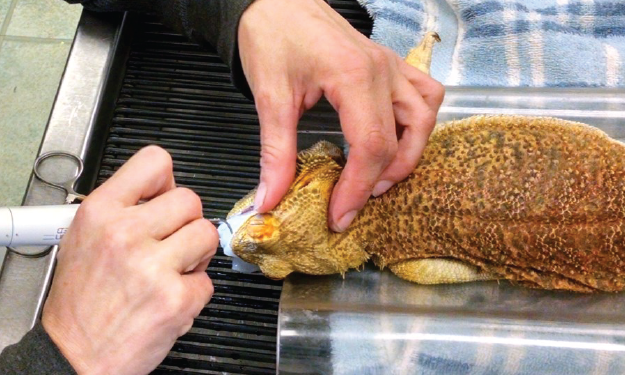Do Lizards Have Teeth?

In February, veterinary hospitals nationwide promote Pet Dental Health Month, where we use this time to educate pet owners of the importance of good dental health.
For exotic animals, most people with rabbits, ferrets, guinea pigs, and chinchillas are aware of their dental needs. One group that is more overlooked are reptiles. Many of our scaly friends do require regular dental care to maintain good health as well!
Reptile Teeth
Reptiles are a very large and diverse group of animals, and this means that there is a diverse array of teeth that we find in the reptile class. Some of the reptiles have teeth that will be replaced when lost, and some only get a single set of teeth to get them through life. Snakes and some lizards have teeth that grow along the inside of the jaw that are normally replaced when lost.
Many of the lizards that we have as pets have a type of dentition called acrodont dentition. Examples of some of the lizards with acrodont teeth are:
- Bearded Dragons
- Chinese Water Dragons
- Chameleons
- Uromastyx
Mouth Rot
Acrodont teeth rest right on the bone and when they are lost, they are not replaced. In addition to that, they are prone to plaque buildup and gingivitis. Resulting infections can damage the gums, erode the jawbone and may also lead to bacteria in the blood that can affect the heart, kidneys and other internal organs.
Commonly known as “mouth rot,” infection of the gums and jaw may be the result of bacteria or fungus. Once an infection is firmly in place, antibiotics alone are unlikely to resolve the concern. The medication is unable to penetrate deep enough into the plaque and the infected tissue to have an effect.
Reptile Dental Procedures
What do we do? Just like you, your dog, or your cat, we do scaling and polishing to clean the teeth. With the plaque removed, antibiotic or anti-fungal medication can be far more effective and resolve the problem more readily. But there’s no good reason to wait for an infection to take hold, either. Removing plaque and cleaning the teeth and surrounding bone is excellent preventative medicine. Why wait for an infection to damage jawbone when you can do a cleaning and prevent the infection in the first place?
In honor of Pet Dental Health Month, we offer the same discount to exotic pets as we do for dogs and cats, so why not schedule an examination today? We can get a cleaning scheduled if one is needed. If not, we can teach you how to help care for your pet’s teeth at home with reptile style tooth brushing!